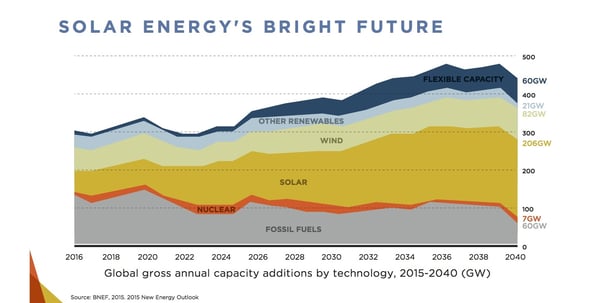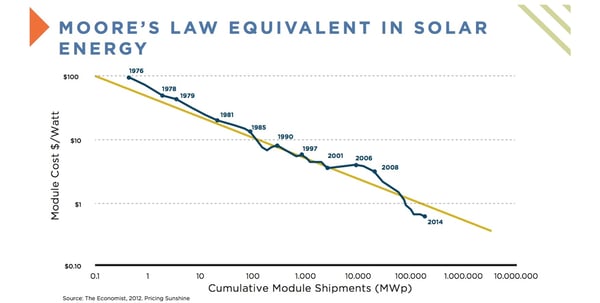We often write about the digital revolution, but in this blog post we thought it would be relevant to highlight another ongoing revolution that could change the world. What I'm talking about here is of course the solar revolution.
The first solar panels were expensive and inefficient, but today solar energy has thanks to innovative startups such as Mosaic and Vandebron become available for the general masses. During the last 7 years the cost of solar power has dropped with 70% while the panels have gotten more effecient and smarter, and as a result of this development we have seen a widespread adoption of this technology.
The prominent author, futurist and entrepeneur Ray Kurzweil predicts that solar power will meet the entire world's need for energy in less than twenty years.
The graph below show that renewables such as solar power will make up two thirds of the energy investment in 2040. From the graph we can also see that the investments in fossil fuel will decline. Much of the future electricity investments will come from developing countries thanks to fast-growing economies and rising populations.
Musk believes that U.S. could meet its energy needs
just by covering a small corner of Utah or Nevada with solar panels.
The prominent author, futurist and entrepeneur Ray Kurzweil predicts that solar power will meet the entire world's need for energy in less than twenty years. The founder of Tesla and SpaceX, Elon Musk, is another thought leader who has high hopes for the future of solar energy. Musk believes that U.S. could meet its energy needs just by covering a small corner of Utah or Nevada with solar panels.

This theory suggests that the cost of photovoltaic cells that's needed to generate solar power drops by 20% with each doubling of global manufacturing capacity.
The supporters of solar energy often refer to Swanson's Law when describing the disruptive growth of solar. The Swanson Effect or Swanson's Law is named after Richard Swanson who founded the American solar-cell manufacturer SunPower. This theory suggests that the cost of photovoltaic cells that's needed to generate solar power drops by 20% with each doubling of global manufacturing capacity. From the graph below we can see that the price of modules / watt has decreased substantially from 1976 to 2014.

According to a study most technologies follow a generalised version of Moore's Law which means that costs tend to drop exponentially over time. The authors of the report argue that we can with the help of these models and theories make predictions about technology cost and performance. This would ofcourse be very useful for businesses and governments that are interested in investing in technology solutions and want a non-biased and objective forecast on future technologies.
A few examples of famous technology companies that have invested in solar:
- In 2015 Google invested $300 million to support SolarCity Corp
- Apple is planning to invest nearly $3 billion for solar facilities in California and Arizona
- Cisco plans to purchase energy from a solar farm in the Californian desert
So why are big tech companies all of a sudden investing in clean energy? According to Fortune this is partly because the price of renewable energy has decreased. Another reason is that the investments in clean energy actually could save these companies money in the long run, particularly if the prices for fossile fuels will become more volatile. An additional reason why tech companies are embracing renewables are according to Fortune that they are trying to acquire a environmentally-friendly image towards their customers and employees.

